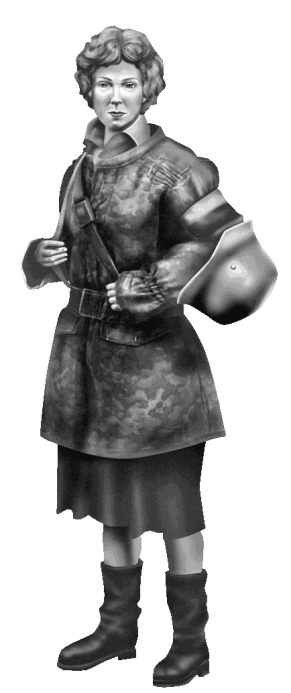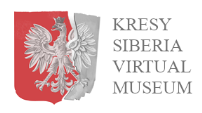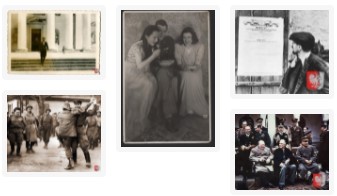
Barbara
Member of the Home Army (Wilenska AK) in Wilno area, North Eastern Borderlands.
Listen to her narrative
Soviet Reoccupation of the Borderlands
1943 was a tragic year for the people in occupied Poland. Nazi terror grew tremendously. In the cities people were afraid to leave their homes because of random street arrests. Those living in the countryside feared yet another German reprisal. The underground was gaining strength – Polish, Lithuanian, Soviet. From Wolyn, Poles were being tortured and massacred by Ukrainian nationalists. And the Jews from the local ghettos were being exterminated. We tried to save as many as we could. To hide them was a great risk to our lives. The Warsaw Jews fought heroically during the destruction of their ghetto. Stalin, Roosevelt and Churchill met again, this time in Teheran. They were deciding the future fate of Europe – ignoring the nations involved.
I continued to work for the underground, serving as a courier for the Home Army. We were aware of the approaching front line. Unable to join Anders Army and fight on the Western Front, the 1st Tadeusz Kosciuszko Infantry Division, led by General Berling under Soviet command, believed that they would liberate Poland from the East.
Finally, the Polish Government in Exile decided to conduct Operation “Storm” – an alliance between the Home Army and the Red Army in the fight against the Germans. We would attempt to play host and greet the Soviets on Polish land.
On January 3, 1944, the Red Army crossed once again into pre-war Poland, near Sarny. We, in the Wilno region, were awaiting Soviet soldiers approaching from Leningrad. We still believed in the ultimate victory of our hard fought underground resistance. We believed that our struggles against the Germans would be valued by Stalin and that there would be no repeat of the repressions from the first Soviet occupation. We were to wrong.
In early 1944, as the Soviet troops approached, we were getting ready to fight for Wilno. Our Wilno region commanders, who revealed themselves to the entering Soviets, got arrested. Similar things happened near Lublin, in Wolyn and near Lwów. Common soldiers were, in the best case, forcibly enlisted into Berling’s Army. Many tried to break through to Central Poland in small detachments. I had family in Wilno and decided to stay. I continued to work as a courier until my arrest.
The reports arriving in London from the regional commanders of the Home Army give a stark and desperate picture of the Soviet advance. My Wilno Commander reported, “Several thousand men have been deported for labour in Russia, and a further mobilization of those aged between 18 and 52 is in progress. We are threatened with a mass deportation of the population as happened in 1939-41.”
With the arrival of the Red Army and NKVD, the deportations of Poles to the USSR, repressions, and destruction of the underground and church hierarchy started once again. A Polish communist government was formed in Lublin in July 1944 and proclaimed Soviet rule over the liberated Polish territory. On September 1, 1944, Warsaw rose against Germans. The Soviets stood on the other side of the Vistula River and provided no help.
Slowly, we lost our delusions that the old Borderlands could be saved from Stalin’s takeover. Propaganda forcibly pushed the idea of a Polish-USSR border along the Curzon Line. It meant that Wilno, Lwów, Grodno and all of Kresy would be left behind the Eastern border.
General Okulicki reported to the Commander in Chief in March 1945 – “Repressions and arrests of AK soldiers continue unceasingly… So far more than 40,000 have been arrested. The fate of the arrested is unknown”.
Finally, it was the Red Army who conquered Berlin. May 8, 1945 – the end of the war. The world is ecstatic. But after six years of occupation, we are still in despair. The iron curtain has fallen over Poland and we are occupied by the USSR. The puppet Lublin Government is not legitimately elected. Hundreds of thousands of Poles are still in the depths of the USSR. Are they still alive? Will they ever return?
In Wilno and in other pre-war Polish lands a fresh wave of arrests and terror started. Trains were departing east, carrying Home Army soldiers to the gulags. They were accused of anti-Soviet activity. Still a young girl, I was arrested in June 1945 and, after brutal interrogation, condemned to 12 years of heavy labor camp in Workuta. But it is a completely separate story.
Facts
4 January 1944, units of the 1st Ukrainian Front crossed the pre-war Polish border in pursuit of the retreating Germans. 16 March 1943 the Soviets decreed the recruitment of Poles in the former “eastern borderlands” into Berling’s Army…
Facts
4 January 1944, units of the 1st Ukrainian Front crossed the pre-war Polish border in pursuit of the retreating Germans
16 March 1943 the Soviets decreed the recruitment of Poles in the former “eastern borderlands” into Berling’s Army
An agreement was not made regarding Polish territory liberated by the Red Army because Polish-Soviet diplomatic relations were broken
The Soviet regime continued to regard the results of the October 1939 “plebiscite” carried out in Soviet-occupied eastern Poland as binding
July 1944 Soviet units crossed the River Bug – which the Soviet authorities regarded as ‘ethnographic’ Poland
21 July 1944 the Polish Committee of National Liberation (PKWN) came into being in Moscow (the “Lublin Committee”)
22 July the Committee’s “July Manifest” was made public.
26-27 July 1944 the PKWN leaders recognised the “Curzon Line” as the post-war Polish-Soviet frontier. Soviet military authorities on Polish territory were also accorded all power regarding the conduct of the war
28 July the members of the PKWN were flown to Chelm to be “liberated” by the Soviet advance.
The PKWN assumed the powers of a government and began to build up its own security apparatus
1 August 1944 the Warsaw Uprising broke out but Red Army units on the outskirts of the city were ordered by Stalin not to intervene
The Red Army resumed its advance for Berlin in January 1945
Polish AK units fought alongside the Red Army against the Germans but as soon as the battles were over the Soviets arrested, executed and deported the AK soldiers
From mid-August 1944 onwards, the NKVD began to carry out wide-scale arrests of Home Army soldiers
A report by General Okulicki to the C-in-C March 1945 “Repressions and arrests of AK soldiers continue unceasingly… So far more than 40,000 have been arrested. The fate of the arrested is unknown”.
30 October 1944 The Decree for the Defence of the State anticipated the most severe measures – usually the death sentence – being used as punishment for relatively innocuous “crimes”
December 1944 a resolution was approved to call into being a Polish Interim Government
March 1945 – 16 Polish underground leaders were arrested, flown to Moscow and put on public trial
Spring of 1945 brutal pacification, along with pillage and summary shootings, spread over the whole of eastern Poland
From 1944-1948 at least 50,000 Poles, and possibly hundreds of thousands, were deported to the Soviet interior


